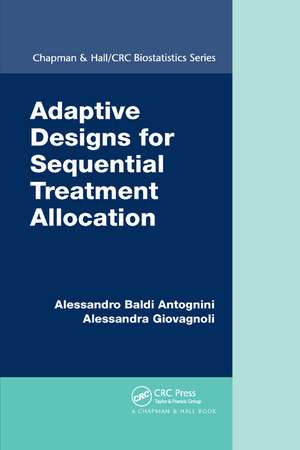Adaptive Designs for Sequential Treatment Allocation
Autor Alessandro Baldi Antognini, Alessandra Giovagnolien Limba Engleză Paperback – 5 sep 2019
The authors first introduce the terminology and statistical models most commonly used in comparative experiments. They then illustrate biased coin and urn designs that only take into account past treatment allocations as well as designs that use past data, such as sequential maximum likelihood and various types of doubly adaptive designs. The book also covers multipurpose adaptive experiments involving utilitarian choices and ethical issues. It ends with adaptive methods that include covariates in the design. The appendices present basic tools of optimal design theory and address Bayesian adaptive designs.
This book helps readers fully understand the theoretical properties behind various adaptive designs. Readers are then equipped to choose the best design for their experiment.
Preț: 489.26 lei
Preț vechi: 575.60 lei
-15% Nou
Puncte Express: 734
Preț estimativ în valută:
93.62€ • 96.58$ • 78.13£
93.62€ • 96.58$ • 78.13£
Carte tipărită la comandă
Livrare economică 27 martie-10 aprilie
Preluare comenzi: 021 569.72.76
Specificații
ISBN-13: 9780367377731
ISBN-10: 036737773X
Pagini: 216
Dimensiuni: 156 x 234 x 13 mm
Greutate: 0.45 kg
Ediția:1
Editura: CRC Press
Colecția Chapman and Hall/CRC
ISBN-10: 036737773X
Pagini: 216
Dimensiuni: 156 x 234 x 13 mm
Greutate: 0.45 kg
Ediția:1
Editura: CRC Press
Colecția Chapman and Hall/CRC
Public țintă
Professional Practice & DevelopmentCuprins
Fundamentals and Preliminary Results. Randomized Procedures That Are Functions of the Past Allocations. Randomized Procedures That Depend on the Responses. Multipurpose Adaptive Designs: Step-by-Step Procedures. Multipurpose Adaptive Designs: Constrained and Combined Optimality. Randomized Procedures That Depend on the Covariates. Appendices. Bibliography. Index.
Notă biografică
Alessandro Baldi Antognini is a full professor of statistics at the University of Bologna. His main research interests include optimal design theory, sequential methods, and applied probability with applications to industrial experiments and biostatistics.
Alessandra Giovagnoli, now retired, was a full professor in the Department of Statistical Sciences at the University of Bologna. Her main research area is the design of experiments, particularly sequential experiments. She is also interested in stochastic order relations and biomedical and technological applications of statistics. She served on the editorial board of Biometrika and was associate editor of SMA, the journal of the Italian Statistical Society. She is on the board of Model-Oriented Data Analysis and Optimum Design (MODA), an international statistical association that promotes research in the area of experimental designs.
Alessandra Giovagnoli, now retired, was a full professor in the Department of Statistical Sciences at the University of Bologna. Her main research area is the design of experiments, particularly sequential experiments. She is also interested in stochastic order relations and biomedical and technological applications of statistics. She served on the editorial board of Biometrika and was associate editor of SMA, the journal of the Italian Statistical Society. She is on the board of Model-Oriented Data Analysis and Optimum Design (MODA), an international statistical association that promotes research in the area of experimental designs.
Descriere
This book presents a rigorous theoretical treatment of the results and mathematical foundation of adaptive design theory. The authors introduce the statistical models most commonly used in comparative experiments. They then illustrate biased coin and urn designs that only take into account past treatment allocations as well as designs that use past data, such as sequential maximum likelihood and doubly adaptive designs. The book also covers multipurpose adaptive experiments involving utilitarian choices and ethical issues and discusses covariate-adaptive methods.
